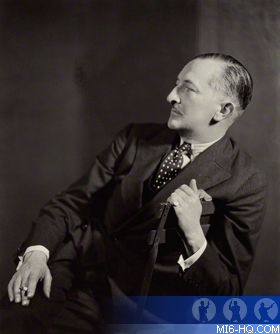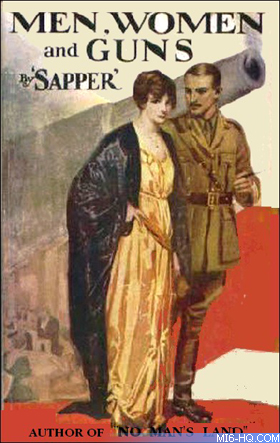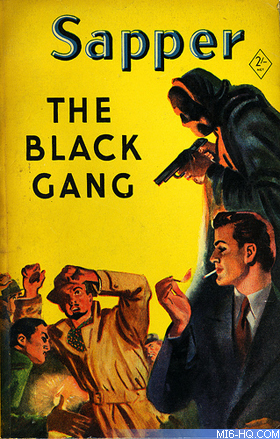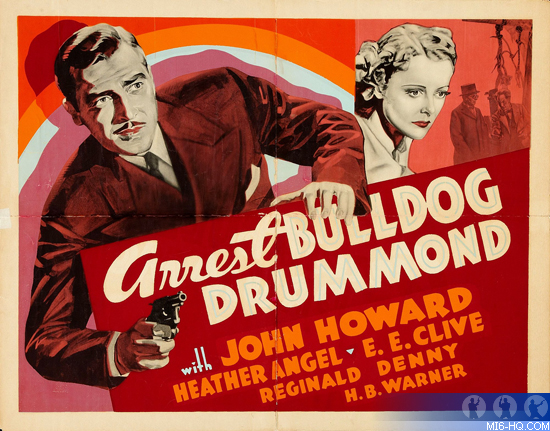A Member Of The Breed
3rd March 2015
Guest writer Benjamin Welton looks back at the adventures of 'Bulldog' Drummond and his creator, H. C. McNeile
Although the British Empire expanded as a result of the First World War, overall confidence was a casualty. Between 1914 and 1918, the British Empire lost well over one million men to death, diseases, and wounds. Many more came home "shell shocked" - a frightening new term for those who found it extremely difficult to readjust to civilian life after being exposed to the prospect of death or dismemberment for so long. As the interwar years dragged on, World War I began to look even worse in hindsight. The war fought in order to "make the world safe for democracy" had in fact helped to lay the groundwork for the subsequent fascist and communist takeovers of much of Europe and Asia. For the British specifically, the legacy of the war not only helped to kickstart the process of decolonisation in Africa and elsewhere, but it also paralysed politicians and much of the general public into thinking that peace, no matter the stipulations or consequences, was preferable to even the most just war. To put it bluntly, World War I birthed the disastrous policy of appeasement.
Not all Brits were so quick to castoff the war as a great tragedy, however. Some veterans actually came to view the culture of the trenches as preferable to civilian life. While in Germany Kasernenleben, or "barracks life," was championed by a certain segment of the revolutionary right, who, fuelled in part by Ernst Jünger's Storm of Steel and their own war experiences, sought to inject the military ethos and the spirit of masculine camaraderie into the bourgeoisie social democracy of the Weimar era, Britain had a much more tame and far less political response, which was simply called "the Breed."
In actuality, the concept of the "the Breed" was exclusive to one man - Herman Cyril McNeile, alias Sapper. Born the son of a Royal Navy officer in Cornwall, McNeile was seemed genetically predisposed towards pursuing the military life. Since McNeile's family had loyally served the crown for generations and could count high-ranking Indian Army officers as relatives, young Herman's decision to attend the Royal Military Academy, Woolwich must have been unsurprising.
Right: Herman Cyril McNeile, alias Sapper.

After graduating, McNeile served as an officer in the Royal Engineers, with postings throughout England and Malta. Then, when World War I broke out, Captain McNeile went to France as part of the British Expeditionary Force. While "Over There," McNeile served with distinction and was even awarded the Military Cross in 1916 after seeing action at Ypres (both battles) and the Somme. Somewhere along the way, he managed to be gassed more than once.
As if living the day-to-day life of a frontline soldier wasn't enough, McNeile also began his writing career in earnest while stationed in France. Since active duty soldiers could not publish anything under their real names, McNeile used the pseudonym "Sapper" (a colloquial term for military engineers) for his first stories, many of which were serialised in the Daily Mail. Daily Mail owner Lord Northcliffe, who came up with the idea of calling McNeile "Sapper," at one point tried to have McNeile removed from active duty in order to hire him as a war correspondent. Lord Northcliffe's attempt ultimately failed, but it was a clear indication that McNeile's writing was at least good enough to appeal to one of Great Britain's most powerful publishers. By the time McNeile left the British Army in 1919 as a Lieutenant Colonel, he had already published five short story collections and countless articles in the Daily Mail and the Times. By his own admission, McNeile had taken up writing out of "sheer boredom."
Peacetime did not sit well with McNeile. Like his fictional counterpart, McNeile found civilian life stale compared to the excitement of war. In order to rectify this, McNeile tried to bring a little bombast back to London in the form of his large, ebullient personality. According to Colin Watson in his seminal work Snobbery With Violence: English Crime Stories and Their Audience, McNeile's personality after the war could best be described as heroic, or at the very least McNeile attempted to portray himself as a great, swaggering hero:
He had a loud voice and employed it unstintingly in company. His laugh was very loud indeed. He liked to enliven clubs and restaurants with the sight and sound of military good fellowship. The meals that he was able to order with part of his dividends from literary success always included immense quantities of caviare and were followed by equally generous intakes of vintage port.
Despite the fame he received from his wartime reminiscences (to say nothing of his monetary gains), McNeile must have still felt the need to create, for in 1920 he published "Bull-Dog Drummond", a novel. The novel's centerpiece is the recently demobilized British Army officer Hugh "Bulldog" Drummond. Drummond, a former Captain in the fictitious Loamshire Regiment, is an independently wealthy, strong, and albeit somewhat ugly young man whose desire for action has not been satiated by the hostilities in Europe. Like his real-life creator, Drummond is bored to death by peace, so, in order to find adventure, he places an advertisement in the Times calling for a great diversion. Drummond's need for thrills is so great that his ad allows for a little illegal activity if no aboveboard work is forthcoming: "legal, if possible, but crime, if of a comparatively humorous description, no objection." This then is how one of the most popular characters in the history of literature and film begins his life.

Above: "Men, Women, and Guns" (1916) one of McNeile's short story collections published during the War.
The 1920s were a great time for industrious writers, and from the cosy mysteries of Agatha Christie to the exaggerated crime stories of Edgar Wallace, British popular fiction was certainly never lacking in examples. McNeile, now known almost exclusively as Sapper, was no different and his Bulldog Drummond novels quickly proved highly successful. Later, these bestselling novels became well-attended films. Although Sapper's novels were rarely critics' darlings, Watson is correct in his assertion that: "Drummond is worth careful examination" because "his popularity could only have been won by a character whose qualities made immediate and strong rapport with the ideas of the reading, and subsequently, the cinema-going public."
The reasons for the immense popularity of Bulldog Drummond are many. One could point to the fact that Drummond's adversaries are almost always easily identifiable villains (foreigners, political radicals, and Bolshevik sympathizers), or the fact that Sapper's prose places a heavy emphasis on action and speed. Guardian writer Nicholas Lezard argues that Drummond presents a "familiar kind of innocence" because of his comfortable British eccentricities and privileges (he has an ex-batman for a servant, whose duty it is to deliver to Drummond his morning beer). Of course, there is also the issue of "the Breed" - Sapper's idealised vision of the proper English gentleman.
As a member of "the Breed," Drummond is a powerfully built man (Sapper places him at over six feet tall and weighing some fourteen stone) with a strong will and an inborn sense of independence. Although deeply influenced by Sherlock Holmes, Drummond is not an intellectual and is in fact more akin to Richard Usborne's negative critique of him as a "brainless hunk of a man." Drummond champions loyalty, especially to his former soldiers, and is unquestionably a British patriot. In the novels, Drummond, a private gentleman-adventurer, takes it upon himself to defend British values against all enemies, both foreign and domestic.
Since McNeile's death in 1937, his stock and that of his creation have fallen quite considerably. Never popular among elitist literary critics, the Bulldog Drummond novels are now widely seen as the very embodiment of post-war Toryism. Called everything from anti-Semitic to xenophobic and even proto-fascist, Bulldog Drummond is not infrequently written of as a sort of literary precursor to Sir Oswald Mosley.
Given this, what then should we make of the fact that Ian Fleming readily admitted on several occasions that James Bond was partially based on Bulldog Drummond?
Right: Cover art for "The Black Gang", Sapper's second Bulldog Drummond Novel.

Making matters worse, Mickey Spillane's private detective Mike Hammer, another influence behind Fleming's creation of Bond, has also been painted with the blackshirted brush. Should we, like John Le Carré, just call Bond a "neo-fascist gangster" and be done with it all?
Obviously, the answer is no. Based on his influences alone, Bond will always be considered a right-wing chauvinist by some, while others will simply despise him, Drummond, and Hammer because of their enormous popularity with the general public. Such is the catch-22 of perennial favourites. But the question remains: should Bond be considered a member of Sapper's "Breed?"

Above: Poster art for "Bulldog Drummond" starring John Howard, the most prolific actor to play the character.
Like Drummond, we first meet Bond while he is in the grips of ennui. The "nauseating" smells of tobacco and sweat at three a.m. are finally starting to irritate Bond just as "Casino Royale" opens, and one gets the feeling that 007 would rather be doing something other than spying on the corpulent Le Chiffre. Still, Bond, as one of Her Majesty's most loyal instruments, stays with the job even if it occasionally bores him.
From here, the subsequent novels and films place the originally weary Bond in a whole series of nail-biting situations, all of which require mountains of derring-do on his part. This is where Bond and Drummond meet - they are without question men of action. Both found their calling during wartime and never looked back. And while Drummond's cases frequently deal with the residue of the First World War, Fleming's Bond is forever battling ex-Nazis and ex-fascists after their postwar conversion to Soviet-style communism.
But while Drummond sought to uphold the conservatism of men like Andrew Bonar Law and Stanley Baldwin, Bond's Britain is no longer a place where Toryism or even the Whiggish conservatism of Edmund Burke can hold the country still. Drummond's England is one that is consolidating gains abroad while keeping its eyes inward; Bond's England is energetic, rebellious, prosperous, but bleeding all along the edges with a constricting empire. Bond's world has the bomb, the miniskirt, and fast cars. If he is a member of "the Breed," then Bond is an idiosyncratic member who occasionally questions his mission (as he does in Casino Royale), while also doing those things that would've made Sapper and Drummond blush. While Bond is certainly a patriotic gentleman who often displays the virile ethos of the military man, he is also an international and cosmopolitan playboy with a staggering libido. More than a mere member of "the Breed," Bond is the new breed who carried some of Drummond's philosophy through the unheroic and white-collar culture of the Cold War.








